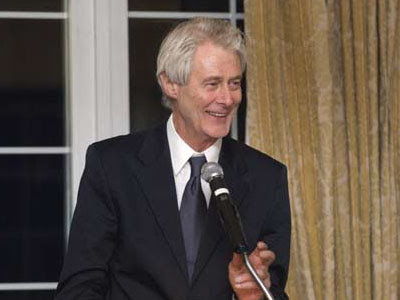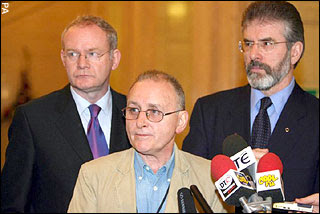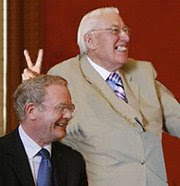
Padraig O'Malley's profile, taken from the Eire Society of Boston's 2008 Gold Medal Awards:
Padraig O'Malley was born in Dublin Ireland in 1942. He was educated at University College, Dublin, and at Yale, Tufts and Harvard universities in the United States.
Professor O'Malley has authored many books, among them the award-winning Uncivil Wars: Ireland Today, Biting at the Grave, and, most recently, Shades of Difference, Mac Maharaj and the Struggle for South Africa. He is recipient of the International Association of University Presidents Peace Award (1985) and the Chancellor's Award for Distinguished Scholars (1985).
Padraig O'Malley is chiefly known for his peace and reconciliation work in Northern Ireland, South Africa and Iraq. For most of his professional life, he has been involved with the conflict in Northern Ireland. Working with all the political parties to the conflict he convened the Amherst Conference on Northern Ireland (Massachusetts, 1975), the Airlie House Conference (Virginia, 1985) and co–convened the Arniston Conference with the government of South Africa (Western Cape, 1997). In 1987 O'Malley initiated a meeting with the dissident Northern Irish hosted by Nelson Mandela in South Africa known as the Great Indaba. In 1992, he participated in bringing some of the South African figures in that transition to Boston for a meeting with representatives of the factions in Northern Ireland. Most recently, O'Malley helped arrange a 2007 conference at a resort in Finland, where 16 Iraqis met with experienced negotiators from South Africa and Ireland who described the processes toward peace in their countries.
Under a deep shroud of secrecy, a chartered flight took off yesterday from Baghdad, carrying with it the dreams of a visionary University of Massachusetts professor and perhaps the prospect of reconciliation among some of the rival religious and political groups in Iraq.
Padraig O'Malley, the irrepressible academic, author, and peacemaker, has put together an extraordinary guest list for the trip from Iraq to Helsinki: 36 Iraqi leaders from across the country's sectarian divide - Sunni, Shia, and Kurd. They are set to spend the next three days talking, in heavily guarded privacy, about how to bring peace, or at least the possibility of political reconciliation, to a nation at war with itself.
It is the second such gathering of Iraqis O'Malley has organized as he takes on the bloody deadlock in that country, just as he previously forged unlikely dialogue between adamant enemies in Northern Ireland and South Africa. And he has high hopes for the weekend sessions, which will take place at an undisclosed location in Finland's capital.
"This is the most powerful group of Iraqis ever gathered outside of Iraq to talk about peace and finding a way forward together," O'Malley said in an interview on his cellphone just moments before boarding the plane...
The plane landed in Helsinki late last night, and the Iraqis were set to begin their talks today. O'Malley envisions the meeting as one in a series designed to find common ground in a land where compromise has become anathema - not to mention mortally dangerous. It is an exceptional enterprise, not just because it is happening at all, which is amazing in itself, but because of the approach O'Malley is using to facilitate reconciliation.
As at the first meeting, last September, negotiators of long experience in the sectarian struggles of Northern Ireland and South Africa will play a critical role.

Martin McGuinness, Denis Donaldson and Gerry Adams
From Northern Ireland come two men who wouldn't share a plane in 1997, when O'Malley brought his idealistic approach to that struggle. One is Martin McGuinness, a former Irish Republican Army commander who now serves as the leading member in the National Assembly and as a government minister. The other is Jeffrey Donaldson, a leader in one of the major Irish protestant parties, the Democratic Unionist Party. Both McGuinness and Donaldson, who once saw each other as mortal enemies, will try to help the Iraqis see, through their example, that it is possible to reach across years of hatred and bloodshed and find a way to work together.
 Martin McGuinness and Ian Paisley.
Martin McGuinness and Ian Paisley. "Think about it," O'Malley said. "Now two people from Northern Ireland who just a decade ago wouldn't fly on the same plane . . . are working jointly to share their story with the Iraqis and tell them how they now work together in the same government."
Among the prominent South Africans set to attend the talks was Mac Maharaj, who for four decades was the head of the African National Congress underground during South Africa's struggle for freedom, and endured 12 years of imprisonment at Robben Island with Nelson Mandela.
The 65-year-old Dublin-born O'Malley, a distinguished professor of peace and reconciliation at UMass-Boston's John W. McCormack Graduate School of Policy Studies, has worked tirelessly for months in Baghdad and by phone from his office in Boston to organize the session, building on the earlier gathering, which hatched what became known as the Helsinki Principles - a framework of common understandings and objectives for further talks.
The initiative, which has become known as the Iraq Project, was launched as a common effort by UMass-Boston, the Institute for Global Leadership at Tufts University, and the Crisis Management Initiative out of Helsinki.
Making the improbable seem possible has been O'Malley's work of the last 30 years.
Back in 1997, O'Malley organized a round of talks that brought the implacable adversaries of "The Troubles" in Northern Ireland together with former combatants who had found a path to coexistence in South Africa.
It is hard to reckon with the idea today, but O'Malley sees more possibilities for peace in Iraq now than he did when first took on the Irish question.
"I think Northern Ireland was a lot tougher conflict to solve than Iraq," O'Malley said. "The violence in Iraq, the killing, is more widespread for sure. But the hatreds in Northern Ireland were deeper, more ancient."
But Sherman Teichman, executive director of the Institute for Global Leadership at Tufts, noted that while many have called for dialogue, few have stepped in to fill the need. "One of the things that perplexes me is why we find ourselves filling this void," Teichman said. "I'm very proud that we've done it. It came down to the intellectual and moral courage of Padraig O'Malley who stands as an example of what one individual can do to work toward peace."
Bendetson, 56, the Tufts Trustee who has supported the effort, flew to Helsinki to serve within the working group of the talks. Before he left, he pointed out that these talks would not have happened without the tireless work of O'Malley, describing him as "the hero at the center of this story."
In an interview just before he flew to Helsinki, Bendetson added: "It's just the right thing to do. Look at how many Iraqis have been killed, how many Americans. It's just not that complicated. It's the right thing to do to work toward resolving the conflict. It's that simple."
An audio interview with O'Malley on NPR's Here and Now - "The Helsinki Agreement" (Story aired on Monday, September 24, 2007)
Padraig O'Malley's website, The Heart of Hope





